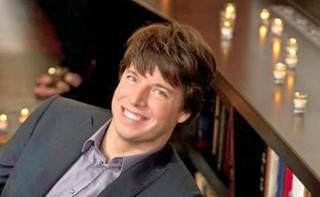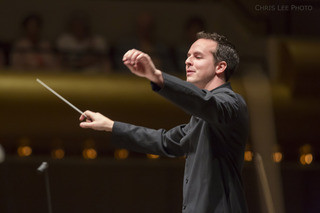|
Back
...and we called for our fiddlers three... New York
Avery Fisher Hall, Lincoln Center
11/12/2014 - November 13, 14, 15, 18, 2014
Claude Debussy: Prélude à l’après-midi d’un faune
Alexander Glazunov: Concerto for Violin in A minor, Opus 82
Sergei Prokofiev: Symphony No. 5 in B-flat major, Opus 100
Joshua Bell (Violin)
New York Philharmonic Orchestra, Case Scaglione (Conductor)

J. Bell (© Mark Holm)
The week of the fiddle came to a close last night (though Joshua Bell, the Phil’s fiddler, will give four more performances). While we might all have our personal feelings about the adept Beethoven, the flexible personalities of Anne-Sophie Mutter, and the business-like honors of Joshua Bell, not one of them was without enormous talent and more than a degree of genius.
Personally, I found the conducting of the young Case Scaglione last night more interesting that Mr. Bell’s easy-going Glazunov Violin Concerto. But perhaps this is because Glazunov has never been a terribly interesting Russian composer.
He was certainly more than an academic (though he held academic positions most of his life), was capable of real inspiration in his “ethnic” string quartets, and his lovely ballet The Seasons. But Glazunov, from a comfortable family, living a comfortable life in the halls of musical academe, was free of scandals. He didn’t drink to excess, didn’t apparently have any secret sexual desires, never had raging feuds, and enjoyed his Euro/Russo compositions.
In other words, he was a very well-situated composer. While the Soviet Politburo was usually wrong in their musical tastes, branding Glazunov a “bourgeois” was probably appropriate.
This is not to dismiss the Violin Concerto, a lovely piece of music, with a hunting-horn them in the finale which stays in the memory longer than it should. It is also exceedingly difficult with a cadenza filled with double-stopping that would make any artist beware.
But this is the kind of music in which Joshua Bell excels. Starting off after a half-measure from the orchestra, Mr. Bell–almost as youthful looking as the conductor–gave an almost nonchalant opening, eschewing whatever “Russian-ness” Glazunov half-heartedly inserted. Once he came to the cadenza, at the end of these two joined movements, he was in his element. Some fiddlers get their thrills by making a cadenza like this seem difficult. Joshua Bell tossed it off, like he was playing scales.
It was impressive (like everything he does), but it wasn’t moving.
Once those trumpets started in the finale, though, Joshua Bell woke up. This theme, stuck in the memory, was anything but subtle, and Mr. Bell, if not dancing his way through it, played his Strad with all the power, the radiance and color for which he find so very very easy.

C. Scaglione (© Chris Lee)
The star of the night, though, was conductor Case Scaglione, a Texas lad who has been making waves since 2011. Named NY Phil Assistant Conductor that year, he was given the Arturo Toscanini Chair, a position revived for him by Alan Gilbert. He filled in for Kurt Masur, worked with the Phil, and this year makes his debuts with dozens of orchestras in America, Europe and China.
Highly enjoyable to watch, he didn’t quite hit the spot with the opening Debussy Prelude to the Afternoon of a Faun. A man of this confidence wouldn’t have been nervous, but the first part was hesitant, a bit off kilter. The Phil’s great Principal Flute Robert Langevin, as usual, gave a steady soothing solo, but Mr. Scaglione’s direction of those retards, those swaying de facto barless measures didn’t quite work, and Phil didn’t quite feel at home.
In the middle, with more regular measures, Mr. Scaglione got his orchestral act together. It was a competent performance, though nobody could say it possessed any of that so difficult refracted light or luminosity we get in great performances.
But Mr. Scaglione real triumph–and a triumph which I would like to hear again–was the Prokofiev Fifth Symphony, in my opinion one of the most colorful, crackling, electrifying symphonies of the 20th Century. And no, it does not possess the early Prokofiev the musical deaths of a thousand stabs. Prokofiev was over 50 when he wrote it, so those daring cuts of his youthful years had become shafts of light. They pierced, they burned, but never fatal.
I have heard this played with more fierceness, more excitement. But Mr. Scaglione had a different take. Though all four movements, he sustained the feeling that this was a work of incredible art, not a Prokofiev-style indictment of the mundane world.
That first movement was an outpouring of music, all taken from a rather mundane theme. The second crackled along with an astringent amiability. The slow movement was an elegiac lament, and the conductor brought the Phil strings to their utmost.
Nobody can resist making the finale a crepitating charged-up piece of orchestral mastery, but Mr. Scaglione did more. The entire Fifth Symphony had been held together with as much good sense as possible, and this finale not only brought all those themes emotionally (and literally) together, but offered a performance that was less acerbic than emotional, less demonic than utterly delightful.
Harry Rolnick
|